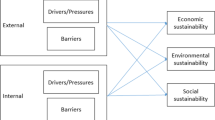Abstract
To pursue the high environmental performance, economic and social effectiveness of the companies, including small and medium enterprises (SMEs), is the key goal of the sustainable development concept. Sustainable development is based on preventive management principles, and their application in SMEs has become an important issue for enhancing competitiveness. Unfortunately, most of the sustainable development-related research is focused on large companies rather than SMEs, especially in the industrial sector. The importance of SMEs often remains unnoticed. Besides, SMEs themselves often have inadequate knowledge about their environmental and social impacts and management, and apply voluntary preventive measures less frequently than large companies. To make sustainable decisions and to improve the environmental performance, economic and social effectiveness of SMEs, an integrated sustainable management system (SMS) based on financial analysis is necessary, oriented to strategic sustainability goals, not requiring significant financial and human resources. Integration of sustainability management accounting and composite sustainable development index methodologies forms the basis of SMS for SMEs decision making. SMS was applied in three pilot SMEs (small-scale wood parquet, medium-scale wood pallets, medium-scale beverage producing companies). In this article, an extensive analysis of a small-scale wood parquet manufacturing company’s case is presented. The application of SMS enabled to identify key sustainability problems and to find solutions to improve the companies’ sustainability performance. SMS application resulted in reduced input materials consumption and the reduction of sustainability costs.

Similar content being viewed by others
Abbreviations
- AHP:
-
Analytic hierarchy process
- BAT:
-
Best available technologies
- EMA:
-
Environmental management accounting
- EMS:
-
Environmental management system
- ICSD:
-
Composite sustainable development index
- IRR:
-
Internal rate of return
- NPV:
-
Net present value
- PP:
-
Payback period
- SD:
-
Sustainable development
- SMA:
-
Sustainability management accounting
- SMEs:
-
Small and medium enterprises
- SMS:
-
Sustainable management system
References
Bennett M, Bouma JJ, Wolters T (2002) Environmental management accounting: informational and institutional developments. Kluwer Academic Publishers, Netherlands
Bennett M, Rikhardsson PM, Schaltegger S (2003) Environmental management accounting—purpose and progress. Kluwer Academic Publishers, Netherlands
Biezma MV, San Cristóbal JR (2005) Investment criteria for the selection of cogeneration plants—a state of the art review. Appl Therm Eng 26(5-6):583–588
European Commission (2007) Small, clean and competitive. Executive summary of the impact assessment
Government of the Republic of Lithuania (2002) Long-term strategy for development of Lithuanian Economy to 2015, Resolution No. 853, Vilnius
Jasch C, Lavicka A (2005) Pilot project on sustainability management accounting with the Styrian automobile cluster. J Clean Prod 14(14):1214–1227
Jasch C, Stasiškienė Ž (2005) From environmental management accounting to sustainability management accounting. Environ Res Eng Manag, ISSN 1392-1649, 4(34):77–88
Kopustinskas V, Alzbutas R, Augutis J (2007) Statistical methods of uncertainty and sensitivity analysis for mathematical model output. Energetics 53(3):10–15
Kotchen MJ (2010) Cost-benefit analysis. In: Schneider S (ed) Encyclopedia of climate and weather, 2nd edn. Oxford University Press, Oxford
Krajnc D, Glavič P (2004) A model for integrated assessment of sustainable development. Resour Conserv Recycling 43(2):189–208
Labonne J (2006) A comparative analysis of the environmental management, performance and innovation of SMEs and larger firms based on the OECD database. Final report. CL Conceil, France
Labuschagne C, Brent AC, van Erck RPG (2005) Assessing the sustainability performances of industries. J Clean Prod 13(4):373–385
Lithuanian Department of Statistics (2007) SME business success factors 2006, Study, Vilnius
Ministry of Economy of the Republic of Lithuania (2007) Business social initiatives analysis: benefits, costs, impact on business and society. Report of applied scientific research, Vilnius
Ministry of Economy of the Republic of Lithuania (2008) Corporate sustainable industrial development (including the assessment of greenhouse gas emissions) effectiveness system and methodology development. Report of applied scientific research, Vilnius
Ministry of Economy of the Republic of Lithuania (2009) Plan for stimulation of economy, Vilnius
Ranganathan J (1998) Sustainability rulers: measuring corporate environmental and social performance. World Resources Institute, Washington, DC
Rikhardsson PM, Bennett M, Bouma JJ, Schaltegger S (2005) Implementing environmental management accounting: status and challenges. Springer, NY
Stasiškienė Ž, Šliogerienė J (2009) Sustainability assessment for corporate management of energy production and supply companies for Lithuania. Int J Strateg Prop Manag 13(1):71–81 (ISSN1648-715X)
Stasiškienė Ž, Staniškis JK (2006) Environmental management accounting in Lithuania: exploratory study of current practices, opportunities and strategic intents. J Clean Prod, ISSN 0959-6526, 14(14):1252–1261
United Nations Division for Sustainable Development (2001) Environmental management accounting procedures and principles. United Nations, NY
Author information
Authors and Affiliations
Corresponding author
Rights and permissions
About this article
Cite this article
Laurinkevičiūtė, A., Stasiškienė, Ž. SMS for decision making of SMEs. Clean Techn Environ Policy 13, 797–807 (2011). https://doi.org/10.1007/s10098-011-0349-1
Received:
Accepted:
Published:
Issue Date:
DOI: https://doi.org/10.1007/s10098-011-0349-1




